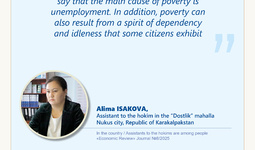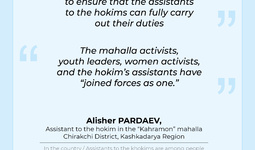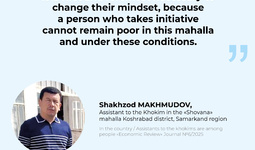— Tell us about your professional activity, how did you come to this position? What did you do before? What skills help you to perform tasks effectively?
— Previously, I worked in the structure of the khokimiyat — I dealt with the issues of the district's economy, banking services, employment, identifying problems and providing assistance on an individual basis. In 2019-2022, I worked as the manager of the Arnasai branch of Xalq Bank JSC. In 2022, I was one of the first to express my willingness to work as an assistant to the khokim, successfully passed an interview and started working at the Yangibuston makhalla in January 2022. All this was very useful in my further work as an assistant to the khokim and helped to solve most of the problems of my makhalla.
— Can you tell us more about the location of your makhalla, the employment opportunities of the residents? What information about the social structure and well-being of the population has been obtained as a result of surveys conducted since the introduction of the Makhallabay system in 2022?
— Our makhalla is located in the Arnasai district and borders 3 districts, the majority of the population is engaged in providing services in agriculture. The makhalla consists of 78 hectares of land, the area where the population lives is 40 hectares. There are 3 manufacturing enterprises, 43 small businesses, 8 service facilities, and 27 grocery stores in the region. There are 2 secondary schools and 1 specialized school in our makhalla, as well as 4 family preschool educational institutions.
The total number of households in the makhalla is 761, the population is 4,476 people, the number of families is 1,064. At the moment, 189 unemployed people have been identified. A plan of measures has been developed to provide targeted assistance to citizens in need, and work is underway to implement it. In particular, with the help of "honadonbay" surveys, studies were conducted to determine the social status of families in the region, the level of use of their homesteads, as well as their desire to engage in entrepreneurship. As a result, households were divided into categories and an addressable "roadmap" was developed to increase their income. Separate documentation was kept for families belonging to the first category, and I set myself the task of increasing their monthly income.
— According to the information received during the surveys, what were the main drivers and priorities for the development of the makhalla? What have you achieved in terms of improving the living conditions and well-being of the population in your first year in this position?
— Agriculture and the service sector were mainly chosen as the driver areas in the makhalla. In addition, residents are engaged in sewing clothes, providing services, making Uzbek kurpacha and home-based work. The aim was to train able-bodied citizens in households in professional and entrepreneurial skills and provide them with income-generating equipment. The state of the region's infrastructure was also studied and the necessary measures to improve it were identified. 36 citizens included in the "Women's Notebook" and "Youth Notebook" received sewing machines and equipment on the basis of subsidies, and registered as self-employed persons.
— Tell us in detail about the results of your activities in 2023, its directions — employment of the unemployed, vocational training, support for the low-income part of the population. What progress have you made in this regard?
— In 2023, measures were taken in the mahalla to employ unemployed citizens. In particular, through self—employment, 13 women were provided with straight-line and "overlock" machines on a preferential basis, 2 women with a motorcycle cultivator, 11 women with sewing machines on the basis of subsidies. Six young people also received equipment on the basis of subsidies. According to the program "Every family is an entrepreneur", loans worth 972 million sums were provided to 50 citizens, as well as new jobs were created, 276 citizens were employed.
About 38 new projects have been developed. 56 citizens received a referral for vocational training and were trained at the monocenter, all of them are employed. 149 people employed in the informal sector of the mahalla were registered and registered as self-employed citizens. 8 new entrepreneurship development projects were also developed, which created 12 new jobs.
— In 2023, a number of decisions were made regarding the activities of the deputy khokim. How have these decisions affected the effectiveness of your business?
— The Presidential Decree on further improving support for makhallas, radically increasing the role of the mahalla institute in society and ensuring its functioning as the first link in solving the problems of the population provides for support for the activities of the Makhalla Seven, assistance in turning the makhalla into an independent and popular structure that performs the function of a "bridge" between the people and the state. Based on this decree, problematic and intractable issues of the mahalla are very quickly being resolved today, as the opportunities provided to the Makhalla Seven allow it to more effectively improve the financial situation of the population.
— What are the priorities for the development of your makhalla this year? What are your plans in this direction?
— Firstly, the task has been set to ensure the implementation of "Individual programs" to lift 10 families from poverty in category I (families whose income is below the poverty line) and increase the incomes of residents of 110 households in category II (low-income families). The goal has also been set to attract the necessary financial resources for the implementation of 10 projects initiated by those wishing to engage in entrepreneurship in the field of services and production. In addition, it is planned to create 189 new jobs and provide employment for the unemployed by solving existing infrastructure issues.
— What else do you think needs to be done to more effectively reduce poverty among the population of your region?
— Based on the results of surveys and research, it became clear that it is necessary to ensure the employment of makhalla families in need of social assistance in the household itself, and to teach them entrepreneurial skills on the principle of a mentor-apprenctice. To do this, 47 women and young people of the makhalla were included in the "Women's" and "Youth" notebooks, after which they were provided with the necessary equipment on the basis of subsidies — sewing machines, stoves, and motorized cultivator equipment.
Despite the abundance of jobs created in the region, attention should be paid to wage increases. Almost the majority of citizens receive income from agriculture, trade and services. In addition, some of the population are entrepreneurs, some work in government organizations. In the field of agriculture, we are working to increase income by growing export products on the principle of "One makhalla — one product". So I think that for the development of makhallas it is necessary to use more internal capabilities.
— Can you assess how the social structure and welfare of the population has changed after the introduction of the post of assistant to the khokim in your makhalla? How many households have managed to get out of poverty during this time?
— During its activity, 38 new business entities have appeared in the makhalla. But the main thing is that people have come to believe that it is possible to get out of poverty by developing entrepreneurship and increasing family incomes, and for this we are making full use of the opportunities created by our President.
Unemployed residents of the makhalla have every opportunity to get a job. Previously, there were cases of red tape and going to various authorities when applying for employment, receiving subsidies, vocational training, and obtaining loans to open your own business. Currently, the efforts of the assistants to the khokim are the greatest helpers of citizens in finding employment and establishing entrepreneurial activities. You can see how they act as a strong bridge between government agencies and the people.
The main thing is that all conditions have been created in our state to work for the benefit of the population, to provide real help in finding a person's place in society, and to improve people's living conditions. During my activity, 424 residents of the makhalla were provided with jobs due to permanent work and self-employment. To do this, we use all our knowledge and experience.
— Tell us about the work on the development of entrepreneurship in the makhalla during the period of your activity as an assistant to the khokim. How many new enterprises have been created and individual entrepreneurs have been provided with jobs during this time?
— Paying special attention to leading entrepreneurs, developing cooperation in the makhalla based on the "Mirishkor experience", we applied the principles of "One makhalla — one product". Together with leading entrepreneurs, we have established cooperation on the organization of greenhouses in 10 farms. And this year, home-based work has been developed, providing jobs for women engaged in raising children and citizens with disabilities who cannot work at enterprises. The entrepreneur takes semi-finished goods to them and takes the finished products.
During my career, 38 new enterprises have been created, where 91 new workplaces have been organized. In addition, based on the allocation and use of grants from international financial institutions, MEHRIMOH LIDER LLC supplied 8 sewing machines worth 60 million sums. Currently, activities are being effectively carried out to ensure the employment of women, strengthen their health, and train them in professions.
— What kind of work is being done in your makhalla to support citizens working abroad and encourage them to return to their homeland? What programs are available to help these people start their own businesses and successfully integrate into the local economy? Can you give examples of successful experiences in this regard?
— The necessary assistance is provided by supporting entrepreneurial initiatives of citizens who have worked abroad and returned with qualifications. In particular, on the basis of the "Every family is an entrepreneur" program, preferential loans have been allocated, and 40 hectares of land in our mahalla have been allocated for agriculture, which is considered the driver of the makhalla. Work has also been established on the principle of "One makhalla — one product". From the experience of Saikhunabad, I can say that citizens who have returned from labor migration are provided with financial support and other types of employment services so that they can grow crops on their homesteads and earn income. Concessional lending is also provided in accordance with the comprehensive program of "Continuous Support for Small Businesses".
— Based on your practical experience as an assistant to the khokim, what suggestions can you give for further improving the activities of the khokim's assistants in Uzbekistan and increasing the effectiveness of their work?
— Currently, we are increasingly using China's experience to reduce poverty. In addition, it is necessary to send assistants to the khokims to other developed countries to exchange experiences and involve them in various educational seminars.
I believe that in an era of rapid economic development, it is necessary to constantly improve knowledge, and it is also necessary to increase attention to digitalization of all areas of work in our activities. Only then will the efficiency of our work increase and the desired result will be achieved. My proposal is to give more powers to the assistants to the khokim for the development of entrepreneurship in the makhalla, ensuring employment and reducing poverty. Then we can help the people even more.
— How has the attitude of the residents of your makhalla changed towards the ongoing reforms?
— The public's trust in the makhalla institute has increased. People believed that their problems would be solved in the makhalla. This also testifies to the trust of citizens in the institution of the "assistant to the khokim". The mood of the makhalla population can be clearly seen in the ongoing construction work and improvement of people's living conditions.
I would also like to emphasize that the establishment of the makhallabay work system and the introduction of the position of assistant to the khokim was a historic event. I am very glad that I am contributing to the development of our country, to the formation of the foundation of a New Uzbekistan. The main thing is to work hard and selflessly to be a direct participant in people's search for their place in society. I am ready to use all my knowledge and experience for this.
Jamoliddin Turdimov, CERR
"Economic Review" Journal №6/2024





















leave a comment